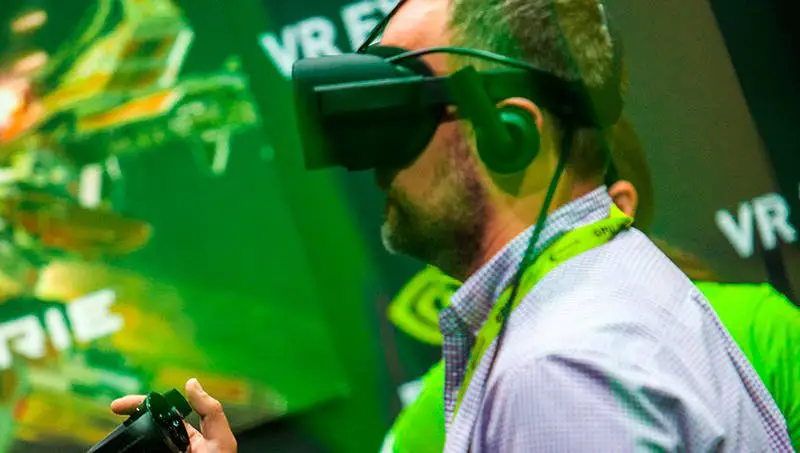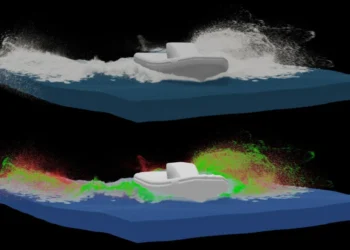No matter the hype and how much certain companies may want to publicize it, virtual reality is failing to replace film as a vehicle and medium of choice for storytelling. NVidia has an article with some hints on why this is happening. More on NVidia’s website.
Why VR is failing at storytelling
Related Posts
Recent Comments
- paul on Miauu releases Layer Colorizer for 3ds Max
- Jumanji on RenderMan 27 beta released
- Animatect on Autodesk pitches AI future for media and entertainment at AU 2025
- Jumanji on SceneLinter Pro: free scene validation script for 3ds Max
- nomad on Anym introduces physics-based animation engine for sparse keyframing in Maya, Blender and C4D
Popular Stories

CGPress is an independent news website built by and for CG artists. With more than 15 years in the business, we are one of the longest-running CG news organizations in the world. Our news reporting has gathered a reputation for credibility, independent coverage and focus on quality journalism. Our feature articles are known for their in-depth analyses and impact on the CG scene. “5 out of 5 artists recommend it.”
© 2025 CGPress











http://www.theverge.com/2016/7/22/12253358/mr-robot-virtual-reality-elliot-flashback-story-sdcc-2016
Failing? That’s a bit harsh considering VR is in its infancy. Someone just has to come along and do it right.
I doubt it will ever replace traditional screen viewing story-telling because of the antisocial aspect of wearing the VR headset, but it can also provide an immersive experience like no other.
1. VR is not in its infancy. It’s been around for decades. Since the 80s as “Virtual Reality” prototypes started donning. Since the 60s since the technology itself first emerged. Since the 1920s sense the “Sensorama” was the first proto-VR machine. It’s just seeing a recent revitalized resurgence, thanks to VR goggles.
2. VR goggles have been around for 4 years now, and STILL haven’t offered much more than tech demos, a nonessential options in a few games, and gear that pretty much nobody wants to wear but enthusiasts.
3. VR sucks for long-term use. For most people, the novelty wears off quickly. After about 30 minutes or so, you just want to stop moving your head so much, and just get back to stationary enjoyment of the movie/game.
4. We already expecting more out of Virtual Reality. For well over 50 years or so, humans have entertained the idea of VR in some form or another, particularly in science-fiction. We’ve excelled the concept to tangible interaction such as the Holodeck in Star Trek and sporting events as in Tron.
VR goggles were “antiquated” in a sense even before they arrived. We’re already ahead of the imagination curve, and without things like haptic feedback or binaural sound included in every VR goggle set, using VR goggles feels ironically one-dimensional.
5. VR is over-hyped. Even if VR should stabilize as a (niche) market as it seems to have, I sincerely doubt it’s “The Future” of entertainment. It’s likely to merely be a form of entertainment that some enthusiasts enjoy, at every chance they get, but not enough for most other people to invest in its peripherals.
*started dawning
Well, there is a reason why there are barely any plays staged in 360 degree theaters.
VR sure has its potential, but it doesn’t seem like it will be able to compete with film or reach a massive audience as a medium for storytelling. At least not in its current incarnation.
It’s just too early to tell. It’s current incarnation is infancy. I would never judge a medium by it’s infant products. Took a long time for DVDs and Blurays to take off.
Looking into my personal magic crystal ball, I don’t think VR will ever replace 2D viewing, but people can enjoy both apples and oranges and both be successful on a large scale so i think they’ll live along side each other.
I was watching Presenz and the last one in the demo, the paper looking miniture people was really amazing. I could see myself paying to see an appropiately lengthed movie in VR. It’s just so impressive.
Just curious, have you tried VR and the good VR experiences like The Lab? And this is just the beginning.
VR isn’t in its infancy–modern VR goggles are. You had attempts at consumer-level VR back in the 80s. The concept suffered back then, too.
Also. DVDs and Blu-rays took a while for adoption for a different reason: They were expensive as hell. Everybody wanted one. It took the PS2 and the PS3 to truly get people to start adopting them. But VR googles are something largely only enthusiasts care enough about to buy–even as we see cheaper solutions arriving.
Finally, I’ve tried VR goggles. It was just about all that I could’ve anticipated. It’s neat for about 10 minutes. Then you find yourself wishing you can either interact with things directly, or just go back to enjoying the game (or movie) in the more natural 2D way.
For most people, I think VR tech will have to see a Holodeck or bust. Otherwise, as it’s been for 4 years now, it’s bound to be a niche market that only enthusiasts carry–like 4K gaming.
I don’t think it has to compete with film as film does not have nearly the same level of immersion, and for a live stage play to match it would have to be for an audience of one.
Because of that there cannot be a one to one transition of theory and practice from the now traditional mediums to VR. To say that VR is failing at storytelling is to say that storytellers are failing to adapt to the new medium.
I think the reality is that there just has not been enough time for a storyteller to make a breakout use of the technology. The same could have been said for 3D CGI and it’s impact on film in the early days. The film Tron began development in 1976 and was not complete until 1982…and even then it is not what I would call a hallmark for storytelling, but for the use of 3D CGI in film. There are enough storytellers interested in VR now that it is only a matter of time before that breakout moment comes.
To some extent, I agree there is some truth to storytellers perhaps failing to adapt to the new medium–heck, you’ve got storytellers who fail the traditional medium all the time, so it comes as no surprise if nobody’s embraced this “new” VR tech well as of yet.
Still, there’s only so much you can do with VR that hasn’t 99% been done with 2D-viewing already. I mean, besides using VR to have some just-at-you moments, or overload the senses with a lot of action at once (like some theme park ride), and other little gimmicks like that, I don’t see how much more VR can improve or otherwise complement the general viewing experience or the leeway for storytelling.
I think there’s room for VR as a market, but I think gaming and movies are the wrong way to go about it. If there’s one venue where VR fits the most, it’s major sporting events, e-concerts, planetariums, and virtual tourism. I think VR works better as a concept when you treat it more like a virtual museum, rather than a means of storytelling.
For similar reasons nobody plays a mobile game for in-depth gaming, I think nobody will be expecting profound storytelling from VR.
* jump-at-you moments
Totally agree with you Ben.
We are in a phase of diminishing returns, the low hanging fruits are already discovered. Unless we change our senses with bionic capabilities all of this is just more layers that are increasingly difficult to profit from.
Yeah, the VR can have have advantage in some situations but forces you to a much bigger investment, i am not just talking about cost, but mental and physical investment, you get from a days job you are somewhat tired you don’t go to do VR, since most of your day energy is already spent.
Excellent point.
VR is not trying to replace film within storytelling. It’s closer to
theatre. It will take another 18 months before there is a decent
portfolio of VR experiences that will really showcase its potential.
Until then, let’s fail forward.
With every turning point of innovation within cinema history there is always a period of experimentation and discovery and soon thereafter the boundaries of cinematic experience are expanded even further. This VR technology is no different. It’s just a matter of time before a few artists capitalize on the strengths of the medium. And those strengths will soon become the working vocabulary for the form. Other artists will expand the vocabulary even further and so forth. This kind of thing like any art movement takes time even decades. The rapid commercialization and expectation to become filthy rich is what is causing this impatience with the current limitations of VR. When you look at La Jete, an interesting and compelling story made of still images and text it easy to remind everyone that limitations of the medium aren’t the problem with making the VR experiences interesting and engaging.
Not when the limit is the human capability. When you have to augment the human body.